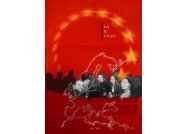turkish-greek civic dialogue - AEGEE Europe
turkish-greek civic dialogue - AEGEE Europe
turkish-greek civic dialogue - AEGEE Europe
Create successful ePaper yourself
Turn your PDF publications into a flip-book with our unique Google optimized e-Paper software.
REUNIFICATION<br />
PHOTOGRAPHY WORKSHOP<br />
Whenever the sun rises, we get blind with this magical sound of the nature;<br />
light… Light is already on its way to reveal us the friends and foes, the<br />
beauties and the beasts and the good and the evil... Most of the time,<br />
mankind is not aware of this magic he is gifted. Here comes the purpose of<br />
“photography”…<br />
Faruk Akbaş was born in 1959 in Mersin. He graduated from Muğla Business<br />
Administration High School. He is the founder of the Kayaköy Art Camp and<br />
Photography House in İstanbul. He was awarded by British Council and Abdi<br />
İpekçi “Friendship and Peace Prize”, Ministry of Culture of Turkey. He is writing<br />
to Photography Magazine every month. His recent books are “The Most Beautiful<br />
Roads of Turkey” (2003), “Technical Reading on Photography” (2003).<br />
Takis Lazos was born in Athens in 1971. He studied at the Department of<br />
Physics at University of Athens and he continued his studies with a Masters<br />
Degree in History and Philosophy of Sciences, University of Athens and National<br />
Technical University (Metsoveio University). Now he studies Photography in<br />
Athens (Technical Department-TEI). He attended the Photography Club of the<br />
University of Athens (POFPA) to follow the lessons and he is still there teaching<br />
to university students. He has participated in many exhibitions of POFPA. He is<br />
interested more in urban places.<br />
Photography Workshop was led by appreciated photography artists of Turkey and<br />
Greece; Faruk Akbaş and Taxis Lazos and supported by Giouli Mpagietakou and<br />
Mesut Öztürk from Anadolu University as well as Mutlu Ekiz from Kayaköy Art<br />
Camp. Workshop participants took various pictures of the villagers, daily life in<br />
Kaya village, as well as the works of participants of other workshops and festival<br />
scenes. They were provided with technical information on photography, on how<br />
to us camera and how to use light. They went out of the village for photo-safari<br />
and photo evaluation sessions. At the end of the festival, they presented their<br />
works of art at a nice exhibition at the Kayaköy Café in the center of village<br />
square. The exhibition was visited both by all festival participants as well as<br />
villagers of Kaya.<br />
Association des Etats Généraux des Etudiants de L’<strong>Europe</strong><br />
Workshop participants stayed in the same cottage house and traveled together<br />
on Mutlu’s orange jeep to take photos.<br />
The photos taken by the workshop participants later on were exhibited in Ankara<br />
at the Middle East Technical University Library in February 2004 accompanied<br />
by an interview with Faruk Akbaş. Many university students in Ankara as well<br />
as the Greek Embassy had the chance to keep traces of KayaFest and the<br />
emotions it evoked. Some exemplary photos are available online at the project<br />
website. www.aegee-ankara.org/trgr, www.<strong>turkish</strong><strong>greek</strong><strong>dialogue</strong>.net<br />
A JOURNEY INTO THE HEART<br />
OF FRIENDSHIP<br />
DOCUMENTARY WORKSHOP<br />
“When we started to work on the idea of the festival, we wanted to create<br />
something permanent. Something that would not disappear from the<br />
memories of the history. So we came up with the idea of the documentary<br />
workshop. Through this workshop we would both manage to make this<br />
event eternal and at the same time create something on our own, just like<br />
our festival…”<br />
The workshop on Documentary was led by Michalis Geranios and Özkan Yılmaz<br />
from İstanbul Bilgi University. 10 Greek and Turkish young participants improved<br />
their documentary preparing skills, script writing. All during the festival they<br />
used their cameras and turned the objective to the festival participants,<br />
villagers and Kayaköy itself. They attended the discussions and rehearsals of<br />
other workshops, performances, and trekking under the sun.<br />
The participants also attended the NGO fair and interviewed NGO representatives<br />
about their projects, villagers about the population exchange and their<br />
memories with Greek immigrants, festival participants about their feelings.<br />
With the technical equipment provided by Istanbul Bilgi University, the editing<br />
of the recorded documentary was also done during the festival in the village<br />
directly by the participants.<br />
KayaFest Youth and Culture Festival<br />
85







